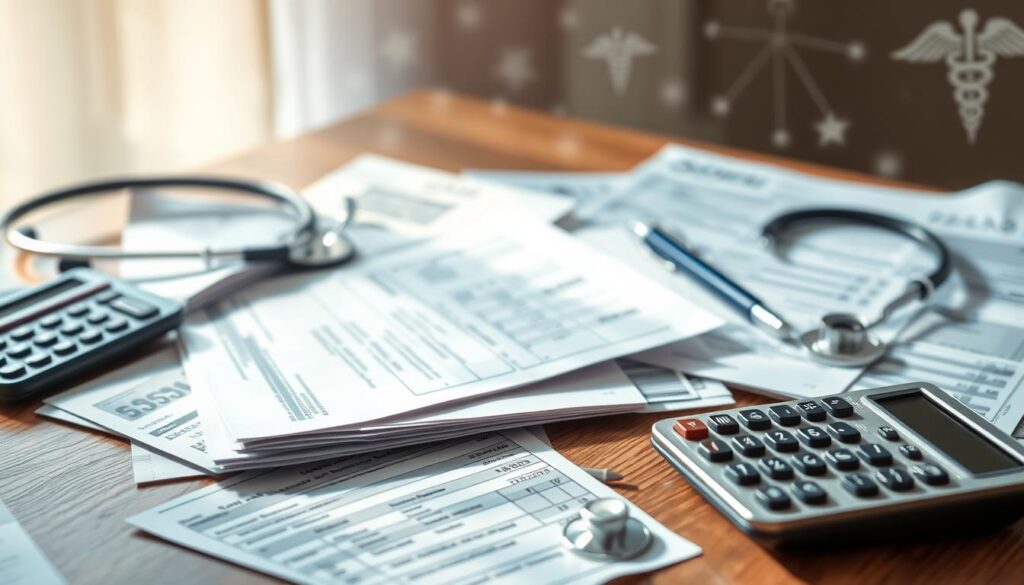Healthcare costs can be overwhelming, especially without insurance. But don’t worry! You can negotiate your medical bills and manage expenses effectively. This guide will help you navigate the process and get fair, affordable healthcare.
You’ll learn strategies to identify billing errors and overcharges. We’ll show you how to communicate with providers for discounts and payment plans. You’ll also discover how to request detailed bills for better negotiation.
We’ll explore financial assistance programs and medical billing advocates. These resources can further reduce your costs. Plus, you’ll learn how to protect your credit score during negotiations.
Key Takeaways
- Understand the intricacies of medical billing practices to identify potential errors and overcharges.
- Communicate effectively with healthcare providers to negotiate discounts and payment plans.
- Request detailed, itemized bills to scrutinize charges and identify areas for negotiation.
- Explore financial assistance programs and seek the help of medical billing advocates to further reduce your costs.
- Protect your credit score by negotiating payment plans and avoiding late or non-payment of medical bills.
Understanding Medical Billing Practices
Medical billing can be confusing, especially for those without insurance. Learning about common practices helps you spot issues and negotiate bills better. This knowledge empowers you to manage your healthcare costs effectively.
Coding Errors and Overcharges
Coding errors in medical billing often lead to overcharges. Healthcare providers use complex codes for billing services. These codes can be misused or applied incorrectly, resulting in inflated charges.
It’s crucial to review your medical bills thoroughly. Question any charges that seem excessive or questionable. This careful examination can help you avoid paying more than necessary.
Uninsured Patient Discounts
Many healthcare providers offer discounts for uninsured patients. These discounts can significantly reduce your out-of-pocket costs. However, they’re often not widely advertised.
Always ask about available discounts when discussing your medical bills. Taking advantage of these offers can lead to substantial savings on your healthcare expenses.
| Medical Billing Practice | Potential Issue | How to Address |
|---|---|---|
| Coding Errors | Overcharges | Review bills carefully, question questionable charges |
| Uninsured Patient Discounts | Lack of awareness | Inquire about available discounts |
Understanding these billing practices helps you manage healthcare costs better. You can negotiate your medical bills more effectively, even without insurance. Stay informed and proactive to ensure fair billing.

Communicating with Healthcare Providers
Talking to healthcare providers is key when negotiating medical bills. Be professional and polite when discussing your finances. This approach can help you get a better outcome.
Set up a meeting with the hospital’s billing department. Explain your situation clearly and show you want to pay. Stay calm and focus on finding a solution together.
Be ready with details about your income and assets. Share any special financial circumstances you have. This shows you’re serious about finding a fair solution.
- Provide a detailed explanation of your financial situation, including your income, assets, and any outstanding debts or expenses.
- Respectfully request a reduction in the overall bill or the opportunity to set up a manageable payment plan.
- Ask about any uninsured patient discounts, financial assistance programs, or charity care options that may be available.
Open and friendly talks with healthcare providers can help. You’re more likely to get a good deal on your medical bills.

“Effective communication is the key to successful medical bill negotiations. Approach your providers with empathy, honesty, and a willingness to work together towards a solution.”
How To Negotiate Medical Bills Without Insurance
Don’t panic if you face big medical bills without health insurance. You can use smart tactics to lower your costs. By knowing your rights and healthcare pricing, you might save thousands of dollars.
Ask for an itemized bill from your healthcare provider. This detailed list can show mistakes or overcharges. Check each item carefully to spot any problems.
- Talk nicely with the billing department about charges. Ask if they offer discounts for uninsured patients.
- Negotiate directly with the provider. Explain your money situation and ask for a lower rate or payment plan.
- Look into financial aid programs. Hospitals or charities may help uninsured people.
- Think about hiring a medical billing advocate. They can fight for you to get better deals.
Stay determined when negotiating medical bills without insurance. Know your rights and use available resources. This way, you can manage your healthcare costs better.
| Negotiation Strategies | Potential Savings |
|---|---|
| Request itemized bill and identify errors | Up to 30% of the total bill |
| Negotiate directly with the provider | 10-50% off the original bill |
| Enlist a medical billing advocate | 20-40% off the original bill |
Use these methods to understand healthcare costs better. You can take charge of your medical bills, even without insurance.

“Negotiating medical bills can be daunting, but with the right approach, you can save a significant amount of money and alleviate the financial stress.”
Requesting an Itemized Bill
Requesting an itemized medical bill is crucial for negotiation. Review charges carefully to spot discrepancies or errors. This thorough scrutiny empowers you to negotiate more effectively with your healthcare provider.
Scrutinizing Charges
Take time to review each line item on your medical bill. Look for inflated or questionable charges. Compare them to the services you actually received.
Ensure you’re not billed for procedures you didn’t undergo. This step can help identify potential overcharges or errors.
- Examine the coding used for the medical services. Ensure that the codes accurately reflect the treatments you received.
- Check for duplicate charges or charges for services that were already covered by your insurance provider (if applicable).
- Identify any supplies or medications that were billed at an exorbitant price.
- Scrutinize the cost of any medical equipment or devices that were used during your treatment.
Careful review of the itemized bill can uncover potential errors or overcharges. This information is vital when negotiating to reduce your overall medical expenses.

“Requesting an itemized bill is like opening a window into the healthcare system. It allows you to see exactly what you’re being charged for, and identify any discrepancies or overcharges that could be costing you money.”
Negotiating Payment Plans
Can’t pay your full medical bill upfront? Consider negotiating a payment plan with your healthcare provider. This approach can make payments more manageable and help avoid extra fees or interest.
When discussing a plan, understand factors like interest rates and associated fees. These elements can greatly impact the overall cost of your medical bill.
Interest Rates and Fees
Many providers offer payment plans, but may charge interest on unpaid balances. To keep costs down, try to negotiate favorable interest rates. Be aware of potential fees like administrative or late payment charges.
Review all terms and conditions carefully. This ensures you fully grasp the financial implications of your payment plan.
- Negotiate the interest rate on your payment plan to keep costs low.
- Ask about any additional fees, such as administrative or late payment fees, and try to have them waived or reduced.
- Understand the complete terms and conditions of the payment plan before agreeing to it.
Being proactive can save you money on medical bills. Communicate openly with your healthcare provider about your financial situation. Flexibility in your approach may help secure a more favorable payment plan.
Seeking Financial Assistance Programs
Healthcare costs can be overwhelming, especially without insurance. But don’t worry! Many financial assistance programs can help. Hospitals, nonprofits, and government agencies offer support to make healthcare more affordable.
Start by exploring options in your area. Many hospitals have their own assistance programs. These often depend on your income and assets. They may offer discounts, payment plans, or full coverage.
- Nonprofit organizations and charities also offer financial assistance for medical bills, targeting specific conditions or demographic groups.
- Government-run programs, such as Medicaid and state-level initiatives, can provide coverage or subsidies for those who qualify based on income and other factors.
Be proactive when seeking financial assistance programs for medical bills. The application process might require detailed paperwork. But don’t give up! The potential savings are worth it.
These resources can help you manage your healthcare cost management effectively. With financial worries eased, you can focus on your recovery and well-being.
| Program | Eligibility Criteria | Benefits |
|---|---|---|
| Hospital Financial Assistance | Based on household income and assets | Discounts, payment plans, or full coverage |
| Nonprofit Charity Programs | Specific conditions or demographic groups | Financial assistance for medical bills |
| Medicaid and State-Level Initiatives | Income-based eligibility | Coverage or subsidies for medical expenses |
“Accessing financial assistance programs can be a game-changer for those facing overwhelming medical bills. It’s crucial to explore all available options to ensure you receive the support you need.”
Enlisting the Help of Medical Billing Advocates
Medical billing can be overwhelming, especially without insurance. Thankfully, medical billing advocates or professional medical bill negotiation services can help you get better outcomes.
Professional Negotiation Services
Medical billing experts have deep knowledge of the industry. They can spot errors in bills and negotiate with healthcare providers for better terms.
These pros understand medical coding, insurance policies, and hospital billing practices. This allows them to fight for you more effectively.
Hiring a medical billing advocate or using a professional medical bill negotiation service offers key benefits:
- Comprehensive review of your medical bills to identify potential errors or overcharges
- Effective negotiation with healthcare providers to secure lower payment amounts or more favorable payment plans
- Guidance on navigating the complex medical billing landscape and understanding your rights as an uninsured patient
- Reduced stress and time spent dealing with medical bills, allowing you to focus on your health and recovery
These services can save you money and ease the stress of managing bills alone. This is especially helpful if you’re uninsured or facing big out-of-pocket costs.
| Service | Average Cost | Potential Savings |
|---|---|---|
| Medical Billing Advocate | $100 – $500 per case | Up to 50% off medical bills |
| Professional Medical Bill Negotiation | 15% – 35% of the total bill amount | Up to 30% off medical bills |
Medical billing advocates and professional medical bill negotiation services can help you save big. Even without insurance, they can cut through the red tape of medical billing.
Protecting Your Credit Score
Managing medical bills without insurance can be tricky. It’s vital to understand how they affect your credit score. Unpaid medical debt can harm your creditworthiness for years.
Be proactive in talking to healthcare providers. Explore options for payment plans or financial aid. Negotiate in good faith and stick to agreed payment schedules.
This shows you’re committed to resolving the debt. It also helps prevent accounts from being reported as delinquent to credit bureaus.
Keep a close eye on your credit reports. Look for any mistakes or wrong medical debt entries. If you find issues, quickly dispute them with credit bureaus.
By staying alert, you can protect your protecting credit score from medical bills. This helps you manage medical debt management responsibly.

